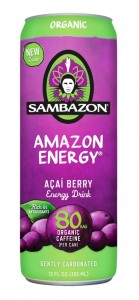
Sambazon is one of a number of companies – including AriZona and Dr Pepper Snapple – singled out by Consumer Reports’ investigation, which measured the amount of caffeine in 27 top-selling energy drinks and shots. The study has received widespread media coverage following last week’s revelation that the consumption of Monster Energy has been linked to six deaths – including a 14 year old girl last December – and 15 hospitalizations since 2009, according to the Food and Drug Administration (FDA)’s Food Safety Adverse Event Reporting System.
“Quite simply, Consumer Reports got it wrong as it relates to Sambazon,” Greg Fleishman, the chief marketing officer of Sambazon, said in the statement. “The safety of Sambazon Amazon Energy is being unfairly and incorrectly questioned due to its inclusion in a round–up of beverages that use the label “energy drink” and media coverage concerning an unrelated brand.”
In its analysis, Consumer Reports looked at a broad spectrum of energy drinks including industry stalwarts Red Bull and 5 Hour Energy, as well as smaller players like Guru and Red Rain. Consumer Reports found while 11 of the 27 drinks investigated do not include a specific amount of caffeine on their labels, five of the remaining 16 products, including Sambazon Amazon Energy, had more than 20 percent above their labeled amount on average in the samples we tested.
Fleishman claimed that because Sambazon labels and markets Amazon Energy as a beverage instead of an energy supplement, the product should not have been included in the Consumer Reports investigation. (It should be noted that the FDA does not utilize a specific classification for energy drinks.) Moreover, Fleishman stated that while the report listed Amazon Energy as having 81 mg of caffeine per 8 ounces of the drink, the correct amount is 53 mg of organic caffeine per 8 ounces.
While it is unclear as to how Sambazon will proceed in its response to the investigation, increased scrutiny of energy drinks is likely to continue. And although the FDA has fended off accusations that it has not investigated that dangers of energy drinks more aggressively, a recent New York Times article indicated that there are “major gaps in the way federal regulators and companies monitor product safety.” The Times cited recently released FDA documents that detail 20 filings from consumers and doctors since 2007 that alerted the agency about deaths and life-threatening injuries related to the consumption of Monster Energy.





